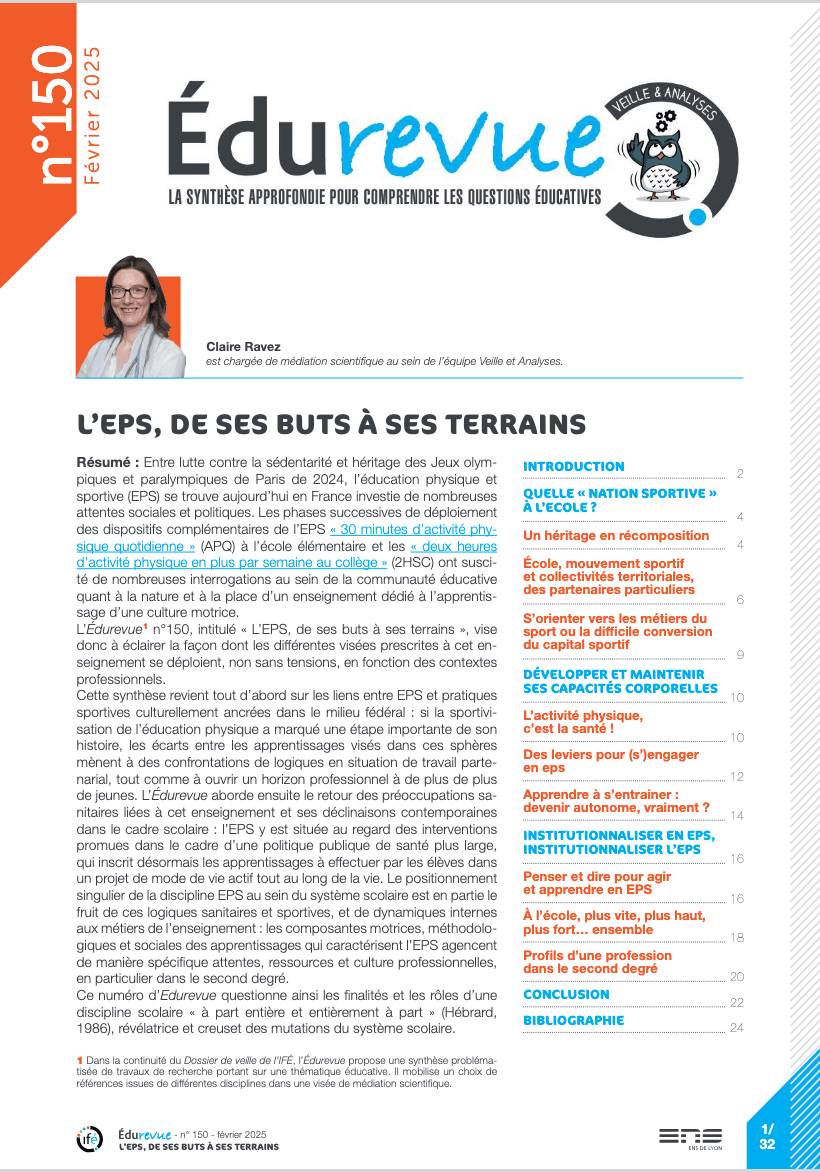Les enfants dans l'école : une sociologie des acteurs sociaux et territoriaux
Auteur(s) : LEVRARD Sophie
Date de soutenance : 2020
Thèse délivrée par : Normandie Université
Section(s) CNU : section 70 : Sciences de l'éducation
Sous la direction de : Julie DELALANDE
Jury de thèse : GILLES BROUGERE ; ISABELLE DANIC ; Mme PASCALE GARNIER ; YVES RAIBAUD ; PATRICK RAYOU ; JULIENNE DELALANDE
"La thèse se propose d’étudier l’articulation entre la socialisation des enfants et les espaces de l’école. Dans le champ de la sociologie de l’enfance, la notion d’acteur et en particulier celle d’acteur territorial permet de comprendre le statut donné aux enfants et plus précisément de comprendre comment ils exercent leur agency dans leur manière d’habiter l’école. Une revue de littérature délimite les concepts de territoire et d’espace, ainsi que celui des tiers-lieux auquel nous donnons une définition pour l’école. L’enquête est menée avec une méthodologie visuelle participative dans laquelle les enfants, de 6 à 11 ans, photographient les espaces de l’école, clichés explicités en groupe lors d’entretiens. Les enfants habitent de différentes manières les espaces de l’école. Ceux qui appartiennent officiellement aux adultes, la classe par exemple, sont habités par les enfants selon les règles imposées par l’institution qui les accueille. Les espaces conçus et dédiés aux enfants, la cour de récréation par exemple, sont occupés de manière conventionnelle. L’occupation accordée par les adultes se fait selon les règles et les usages imposés par ces derniers mais sont globalement bien intégrés par les enfants. Enfin, une troisième catégorie d’espaces se distingue. Il s’agit des espaces créés ou détournés par les enfants. Ils sont délimités, défendus et habités par eux et pour eux. Ainsi, moins l’adulte investit l’espace, plus les enfants en prennent possession pour loger leurs jeux, leur culture enfantine, se socialiser selon leurs propres règles. Alors, dans l’école, l’espace conçu, c’est-à-dire l’espace physique dédié ou imposé aux enfants, se confronte à l’espace vécu, celui créé par les enfants, celui qu’ils imaginent, qu’ils s’approprient, en d’autres termes, leur territoire. "
Children in school : a sociology of social and territorial actors
"The thesis proposes to study the articulation between the socialization of children and the spaces of the school. In the field of the sociology of childhood, the notion of actor and in particular that of territorial actor makes it possible to understand the status given to children and more precisely to understand how they exercise their agency in the way they live in school. A literature review delineates the concepts of territory and space, as well as that of third-places to which we give a definition for the school. The survey is conducted with a participatory visual methodology in which children, aged 6 to 11, photograph the school spaces, taken in groups during interviews. Children live in different school spaces. The spaces that officially belong to adults, the class for example, are inhabited by children according to the rules imposed by the institution that welcomes them. The spaces designed and dedicated to children, such as the playground, are occupied in a conventional way. Adult occupancy is done according to the rules and practices imposed by them but are generally well integrated by children. Finally, a third category of spaces stands out. These are spaces created or hijacked by children. They are demarcated, defended and inhabited by them and for them. Thus, the less space the adult invests, the more children take possession of it to house their games, their child culture, socialize according to their own rules. Then, in the school, the space designed, that is, the physical space dedicated to or imposed on children, confronts the space lived, that created by the children, the one they imagine, that they appropriate, in other words, their territory."
URL : https://tel.archives-ouvertes.fr/tel-02997547/document
mot(s) clé(s) : approches territoriales, sociologie de l'éducation












